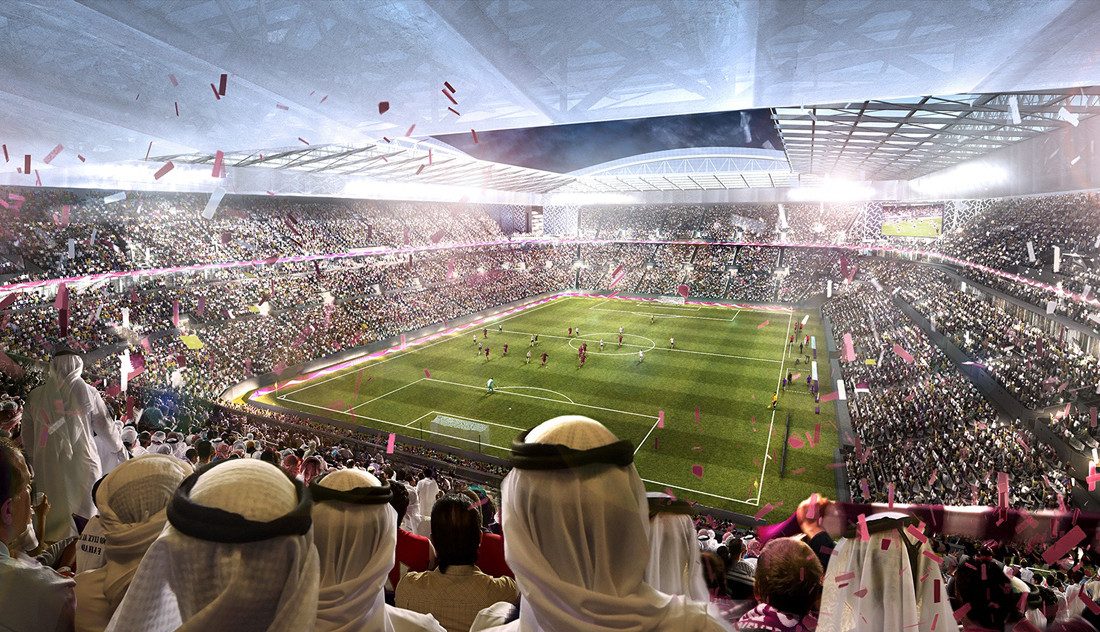From Qatar to the Americas: Lessons for the 2026 World Cup

While the 2022 FIFA World Cup Qatar is still a year and nine months away, a virtual panel on Feb. 8 looked beyond the tournament.
The panel, organized by Georgetown University in Qatar and the US-Qatar Business Council, featured Danyel Reiche, visiting associate professor of political science at GU-Q, and Simon Chadwick, director of Eurasian sport at Emlyon Business School.
The 2026 World Cup will be jointly hosted by the United States, Mexico and Canada. In the build-up to and following the 2022 tournament, there is room for collaboration between Qatar and the US as the latter prepares to host the next edition. “We [USQBC] have a two-fold interest in FIFA, as it’s [the World Cup] scheduled to be hosted in Qatar in 2022, and partially in the U.S. in 2026,” said Sheikha Mayes Al-Thani, the managing director at USQBC.
“There are many business connections to be made and lessons to learn to carry forward,” she added.
Ahead of next year’s World Cup, GU-Q has been conducting research around sports policy and politics. “We are interested in taking what we have learnt from the 2022 event to inform the 2026 event,” said GU-Q Dean Ahmed Dallal, who introduced the event’s speakers and spoke about the university’s research initiatives.
These include the project “Building a Legacy: Qatar FIFA World Cup 2022,” led by Danyel Reiche, a professor in international politics at GU-Q, and the book “Sport, Politics, and Society in the Middle East,” published in 2019, which both Reiche and Chadwick contributed to.
With the upcoming World Cup, Qatar is not just “competing with traditional centers of global sport but also pursuing global aims, such as contributing to national standing and security,” Dallal said.
Reiche compared and contrasted the 2022 World Cup and the tournament in 2026. He juxtaposed the logos of both events, describing their key elements: sand dunes, the number eight (the number of stadiums) for 2022, and the colors of the flags of the three countries for 2026.
A major change between the World Cups has been in the host selection process. “For 2022 and 2018, just the FIFA executive committee made the decision. Now the entire FIFA assembly makes a decision,” Reiche said.
The 2026 World Cup will be the first multi-host contest since 2002 when Japan and South Korea co-hosted the tournament. The reasons for sharing a World Cup can be economic or political.
In the case of the U.S. co-sharing the 2026 tournament, “they don’t do this for economic reasons, they do it for political reasons,” Reiche said, citing earlier tensions between the United States and Mexico over former President Trump’s border wall.
The first 48 nation tournament, the 2026 World Cup will open up slots to Asian and African countries in particular, from four to eight and from five to nine respectively, Reiche noted. The shift from a single host to multiple hosts for the 2026 tournament will create new markets, he added.
Chadwick discussed the business of mega events. With the expansion of the World Cup, “more matches [80 games from the previous 64] mean more selling opportunities,” he said.
When it comes to major sporting events, Chadwick noted the importance of creating “experiences around the core event [football matches].” Qatar’s efforts to this end include the work done by the Qatar Tourism Council and the Visit Qatar initiative, he added.
The logic behind bidding for and hosting international tournaments is often explained as an effort to create political capital. “What seems to be increasingly apparent… is that bids are intended to have a purpose,” he said.
In more recent years, that purpose tends to align with the United Nations’ sustainable development goals. In Qatar’s case, “building an infrastructure beyond oil and gas is a challenge,” he noted.
In a Q&A session moderated by Dima Wahbeh, business engagement manager at USQBC, Reiche was asked about the role of academic research on mega events.
“It [the World Cup] impacts society on many levels, and this is what we want to look at: the social, political and economic changes that are coming with hosting this great event,” he said.












